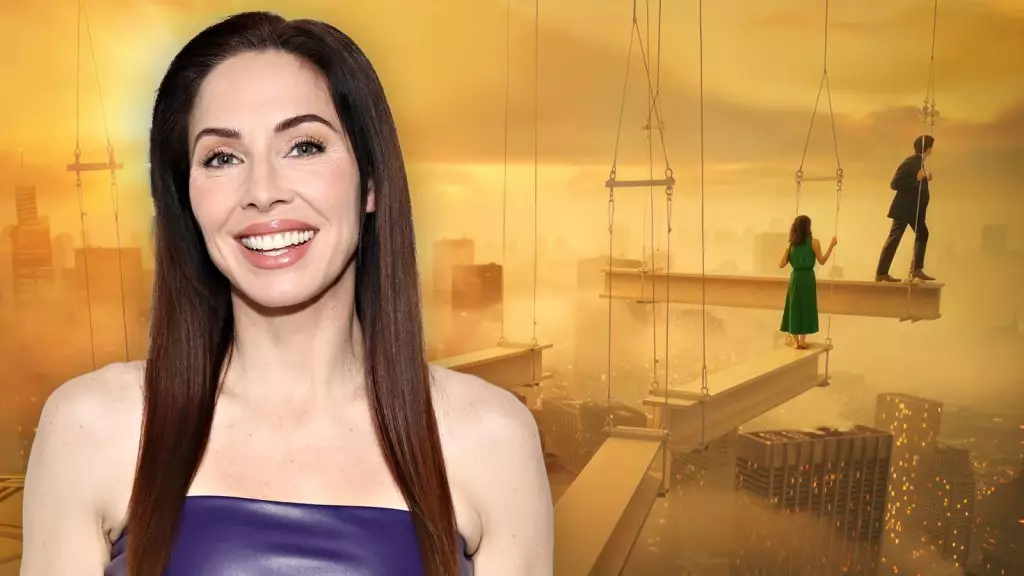In the realm of Hollywood, auditions can serve as both a launching pad for future success and a source of emotional turmoil. For comedian and television host Whitney Cummings, her audition for Francis Ford Coppola’s ambitious film, *Megalopolis*, was an experience filled with disbelief and discomfort. In a candid recounting during the *Good For You* podcast, Cummings pulled back the curtain on what she described as a traumatic and “humiliating” experience. Her revelation begs the question: just how can an audition feel so disorienting, and what factors contribute to making it an experience she’ll never forget?
Cummings prepared extensively for this opportunity; she devoted several days to memorizing her lines, a commitment that signifies her dedication to the craft. However, the moment she arrived at the audition, Cummings sensed an overwhelming shift in atmosphere. It was not the usual buzz and camaraderie common to auditions. The environment felt tense, almost suffocatingly silent, leaving her to ponder what exactly was about to unfold.
In a departure from traditional audition practices, Coppola’s approach was anything but typical. Instead of sticking to scripted lines, he opted for an improvisational method, forcing Cummings to delve into spontaneous acting on the spot, a style that can quickly bring both excitement and anxiety. One of the particularly unusual prompts involved her bidding farewell to a fictional son headed off to war, employing an English accent. Another had her confronting a husband in an Australian accent. Cummings humorously suggested that it felt as if she were being pranked, much like the premise of her past television venture, *Punk’d*.
The pressure intensified as she attempted to navigate through this surreal experience, leading her to a psychological state that many can relate to—disassociation. “I started glazing over,” she recalled. This response is more common than one might expect; under high-pressure situations, particularly in creative fields like acting, it is not uncommon for individuals to feel as if they are floating outside of their bodies, observing rather than fully participating in the experience.
For Cummings, what should have been an empowering moment of artistic expression turned into a source of embarrassment. The culmination of the audition was perhaps the most striking: Coppola presented her with a signed copy of his book and a bottle of his wine, gesturing as if she had attended a casual autograph signing rather than enduring a grueling audition process. The juxtaposition of this act against the backdrop of her experience only deepened the inherent humiliation she felt.
While her discomfort was palpable, the aftermath of such creative encounters can often provide invaluable lessons. Being thrust into improvisational acting in such a high-stakes environment can teach resilience and adaptability—qualities that are essential in the unpredictable world of filmmaking. Cummings’ honesty about her experience invites aspiring actors to approach their auditions with courage, recognizing that even seasoned performers encounter challenges that are startlingly awkward or unconventional.
Cummings’ recollection serves as a vital reminder of the risks inherent in artistic professions. Beyond the glitz and glamour associated with Hollywood, the industry is peppered with moments of intense vulnerability that could lead to crushing self-doubt. Yet, it is precisely those challenging moments that can define an artist and shape their work. While *Megalopolis* may not have achieved the commercial success one would expect from a film associated with Coppola—grossing over $13 million against a budget of $120 million—it nevertheless stands as a testament to the filmmaker’s uncompromising vision.
In recounting her audition experience, Whitney Cummings adds a layer of humanity to the perception of Hollywood’s elite, reminding all of us—fans and aspiring artists alike—that everyone has shared experiences of embarrassment and uncertainty. This creates a sense of community among actors, showing that vulnerability can often lead to unexpected connections and profound personal growth. In the end, the journey through the audition is as significant as the outcome; it is a collection of moments that shape one’s identity as an artist.


Leave a Reply